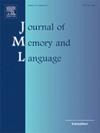提高真假识别率
IF 3
1区 心理学
Q1 LINGUISTICS
引用次数: 0
摘要
朗读效应是指朗读信息比默读信息更能增强记忆。在五个实验中,我们考察了在 DRM 范式中制作对真假记忆的影响。在实验 1a、1b、3a 和 3b 中,朗读与默读进行了比较。在实验 2 中,朗读与默读进行了比较,同时听到了另一个声音说出的单词。在所有实验中,朗读都能更好地识别已学过的单词,但同时也会对与已学过的单词语义相关的未学过的诱饵产生更多误报。我们根据目前关于错误记忆的理论解释提出了一个论点,即朗读会有选择性地增强关系或要点处理--对项目间共同特征的编码,而不是项目或逐字处理--对单个项目具体细节的编码。这种选择性增强可能是针对共享语义网络(要点),也可能是针对朗读的共享语境(错误归因的源记忆),或者两者兼而有之。因此,将增加新特征(语境信息)与丰富现有特征(语义信息)相结合,最能体现制作的好处。本文章由计算机程序翻译,如有差异,请以英文原文为准。
Production increases both true and false recognition
The production effect is the finding that reading information aloud enhances memory relative to reading information silently. In five experiments, we examined the influence of production on true and false memory in the DRM paradigm. In Experiments 1a, 1b, 3a, and 3b, reading aloud was compared to reading silently. In Experiment 2, reading aloud was compared to reading silently while hearing the words spoken by another voice. In all experiments, reading aloud consistently resulted in better recognition of studied words, but it also consistently resulted in more false alarms to unstudied lures that were semantically related to the studied words. We advance an argument based on current theoretical accounts of false memory wherein reading aloud selectively enhances relational or gist processing—the encoding of shared features across items—rather than item or verbatim processing—the encoding of specific details of individual items. This selective enhancement could be for the shared semantic network (gist), for the shared context of reading aloud (misattributed source memory), or for both. Thus, the benefit of production is best captured by the combination of adding new features (contextual information) together with enriching existing features (semantic information).
求助全文
通过发布文献求助,成功后即可免费获取论文全文。
去求助
来源期刊
CiteScore
8.70
自引率
14.00%
发文量
49
审稿时长
12.7 weeks
期刊介绍:
Articles in the Journal of Memory and Language contribute to the formulation of scientific issues and theories in the areas of memory, language comprehension and production, and cognitive processes. Special emphasis is given to research articles that provide new theoretical insights based on a carefully laid empirical foundation. The journal generally favors articles that provide multiple experiments. In addition, significant theoretical papers without new experimental findings may be published.
The Journal of Memory and Language is a valuable tool for cognitive scientists, including psychologists, linguists, and others interested in memory and learning, language, reading, and speech.
Research Areas include:
• Topics that illuminate aspects of memory or language processing
• Linguistics
• Neuropsychology.

 求助内容:
求助内容: 应助结果提醒方式:
应助结果提醒方式:


